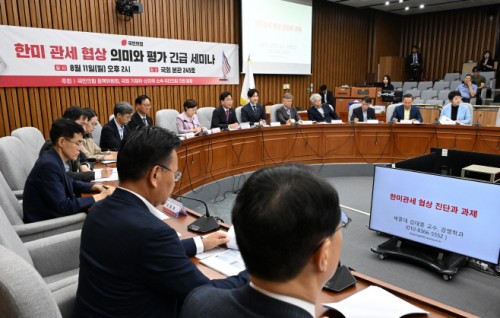 |
| Song Eon-seok, interim leader and floor leader of the People Power Party, speaks during an emergency seminar on the U.S.-Korea tariff negotiations at the National Assembly in Seoul on August 11. / Song Ui-joo |
The People Power Party (PPP) sharply criticized the outcome of the recent U.S.-Korea tariff negotiations, warning of severe repercussions for key industries and fiscal stability. Party officials argued that the agreement — which leaves in place a 15% tariff on automobiles, maintains a 50% tariff on steel, and allows for a possible 100% tariff on semiconductors — will deal a serious blow to the nation’s industrial core.
At an emergency seminar in the National Assembly titled “The meaning and assessment of the U.S.-Korea tariff negotiations,” PPP leaders and industry experts assessed the impact of the deal reached late last month.
PPP floor leader and interim chair Song Eon-seok raised concerns over the scale of Korea’s pledged $450 billion investment in the U.S., questioning whether it is purely private sector capital or involves government-backed loans and guarantees. “Given our foreign exchange reserves of $410.2 billion, it appears inevitable that national funds will be used for U.S. investments,” Song warned.
PPP Policy Committee Chair Kim Jung-jae said the agreement undermines Korea’s long-held tariff advantage over Japan and the EU, calling the government’s lack of industry support measures “a dereliction of duty.”
Rep. Na Kyung-won stressed that the negotiations should not be viewed solely as a trade issue. “Diplomatic relations with the U.S. are more important than tariffs,” she said, adding that Korea’s stance on joining Washington’s China strategy will determine the success of future negotiations.
Experts at the seminar described the deal as a “compound crisis” affecting the economy’s structure, diplomacy, and security. Kim Joo-hong, executive director of the Korea Automobile Mobility Industry Association, noted that 51% of Korea’s car exports go to the U.S., and tariffs would reduce profitability by 32.5%. He urged the government to provide targeted support for parts suppliers and costs related to U.S. market entry.
Most Read
-
1
-
2
-
3
-
4
-
5
-
6
-
7





















